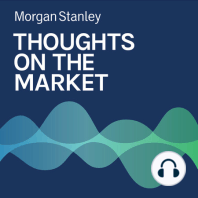4 min listen

Chetan Ahya: What Would Trigger Rate Hikes in Asia?
Chetan Ahya: What Would Trigger Rate Hikes in Asia?
ratings:
Length:
2 minutes
Released:
Oct 12, 2023
Format:
Podcast episode
Description
Although inflation is largely under control in Asian economies, central banks could be pushed to respond if high U.S. yields meet rising oil prices.----- Transcript -----Welcome to Thoughts on the Market. Chetan Ahya, Morgan Stanley's Chief Economist. Along with my colleagues bringing you a variety of perspectives, today, I'll discuss how higher U.S. rates environment could affect Asia. It's Thursday, October 12th, at 9 a.m. in Hong Kong. Real rates in the U.S. have risen rapidly since mid-May and remain at elevated levels. Against this backdrop, investors are asking if Asian central banks will have to restart their rate hiking cycles. We think Asia should be less affected this time around, mainly because of the difference in inflation dynamics. As we've highlighted before on this show when compared to the U.S., Asia's inflation challenge is not as intense. In fact, for 80% of the economies in the region inflation is already back in the respective central bank's comfort zone. Real policy rates are already high and so against this backdrop, we believe central banks will not have to hike. However, we do think that the central banks will delay cutting rates. Previously, we had expected that the first rate cut in the region could come in the fourth quarter of 2023, but now we believe that cuts will be delayed and only start in first quarter of 2024. So what can trigger renewed rate hikes across Asia? We think that central banks will respond if high U.S. yields are accompanied by Brent crude oil prices rising in a sustained manner, above $110 per barrels versus $85 today. Under this scenario, the region's macro stability indicators of inflation and current account balances could become stretched and currencies may face further weakness. In thinking about which central banks might face more pressures to hike, we consider three key factors, economies with lower yields at the starting point, economies running a current account deficit or just about a mile surplus and the oil trade deficit. This suggests that economies like India, Korea, Philippines and Thailand, may be more exposed and so this means that the central banks in these countries may be prompted to begin raising rates. In contrast, the economies of China and Taiwan are less exposed, and so their central banks would be able to stay put. Thanks for listening, and if you enjoy the show, please leave us a review on Apple Podcasts and share Thoughts on the Market with a friend or colleague today.
Released:
Oct 12, 2023
Format:
Podcast episode
Titles in the series (100)
Michael Zezas: Indirect Impacts by Thoughts on the Market